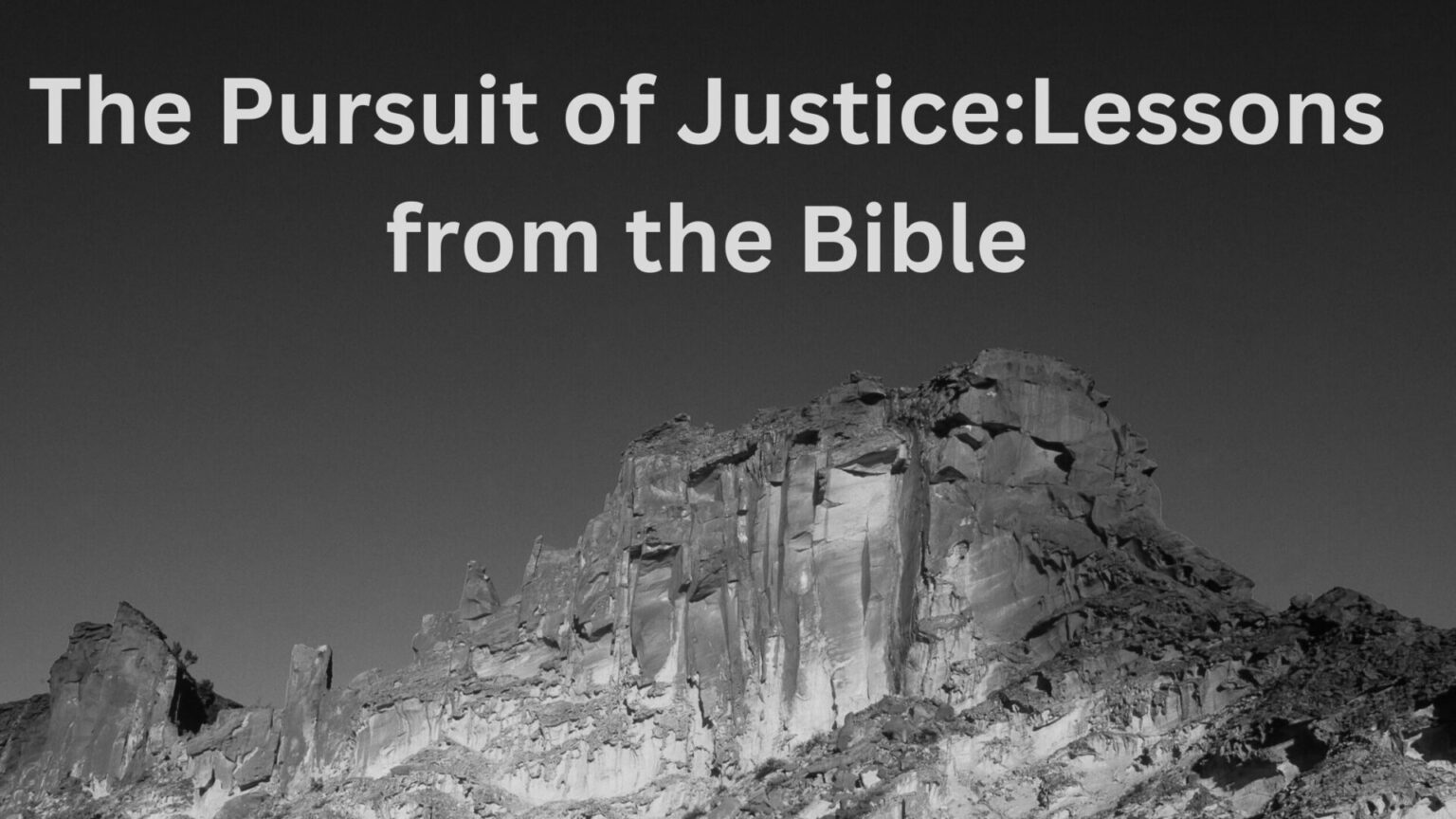Article:
“The Pursuit of Justice: Lessons from the Bible“

In the timeless pages of the Bible, the concept of justice echoes throughout its narratives, teachings, and laws. From Genesis to Revelation, the pursuit of justice stands as a foundational principle, guiding humanity in its interactions with one another and with the divine.
The Pursuit of Justice
Throughout Scripture, we encounter numerous examples of God’s commitment to justice. From the liberation of the Israelites from Egyptian bondage to the prophetic calls for societal equity and fairness, the Bible portrays justice as an integral aspect of God’s character and His dealings with humanity.
One of the most renowned passages on justice comes from the prophet Micah, who succinctly encapsulates its essence: “He has told you, O man, what is good; and what does the Lord require of you but to do justice, and to love kindness, and to walk humbly with your God?” (Micah 6:8, ESV). Here, justice is not presented as an abstract ideal but as a practical mandate for righteous living. It involves not only the administration of fair judgments but also the cultivation of a compassionate and merciful attitude towards others.
Moreover, the Bible consistently emphasizes the imperative of justice for the marginalized and vulnerable members of society. The Mosaic Law contains provisions for the equitable treatment of widows, orphans, and strangers, reflecting God’s concern for the oppressed and disadvantaged (Exodus 22:21-24; Deuteronomy 24:17-22). Jesus Himself prioritized the cause of the downtrodden, proclaiming blessings upon the meek, the hungry, and the persecuted (Matthew 5:3-12).
However, the pursuit of justice in the biblical sense extends beyond mere legalism or social activism. It encompasses a transformative vision of societal renewal and reconciliation. Isaiah envisions a future where justice reigns supreme, transforming the wilderness into a fertile land of peace and harmony (Isaiah 32:15-18). This eschatological hope inspires believers to actively engage in the work of justice, confident in the ultimate triumph of God’s kingdom.
What are some key examples from the Bible that illustrate the importance of justice in God’s character and dealings with humanity?
! Here are some key examples from the Bible that illustrate the importance of justice in God’s character and dealings with humanity:

- The Exodus Story: In the book of Exodus, God hears the cries of the Israelites who are oppressed and enslaved in Egypt. He raises up Moses to lead them out of bondage, demonstrating His commitment to justice by delivering them from oppression and fulfilling His covenant promises.
- The Prophetic Calls for Justice: Throughout the prophetic books of the Old Testament, we see numerous calls for justice. Prophets like Isaiah, Amos, and Micah repeatedly condemn social injustice, oppression of the poor, and corruption among the powerful. They remind Israel of their responsibility to act justly and show mercy, reflecting God’s character.
- The Story of Job: The book of Job grapples with the question of suffering and justice. Job, a righteous man, experiences immense suffering, leading him to question why he is being punished. Through this narrative, God challenges human understanding of justice, ultimately affirming His sovereignty and wisdom.
- The Ministry of Jesus: Jesus’ ministry on earth exemplifies God’s commitment to justice and mercy. He consistently reaches out to the marginalized, heals the sick, and confronts religious hypocrisy and injustice. His teachings on love, compassion, and forgiveness emphasize the importance of justice grounded in divine love.
- The Parable of the Good Samaritan: In Luke 10:25-37, Jesus tells the parable of the Good Samaritan to illustrate the true meaning of loving one’s neighbor. This story highlights the importance of showing compassion and justice to all, regardless of social or ethnic boundaries.
- The Sermon on the Mount: In Matthew 5-7, Jesus delivers the Sermon on the Mount, outlining principles of kingdom living. He blesses the meek, the merciful, and the peacemakers, and challenges his followers to seek righteousness and justice in their actions and attitudes.
- The Cross and Resurrection: The ultimate demonstration of God’s justice and mercy is seen in the death and resurrection of Jesus Christ. Through His sacrificial death, Jesus atones for sin and reconciles humanity to God, offering forgiveness and redemption to all who believe.
What practical mandates for righteous living does the Bible offer in relation to justice?
The Bible offers several practical mandates for righteous living in relation to justice. These mandates provide guidance for individuals and communities on how to embody justice in their daily lives. Here are some key principles:
- Treat Others Fairly: The Bible emphasizes treating others with fairness and equity, regardless of their social status or background. Leviticus 19:15 states, “You shall do no injustice in court. You shall not be partial to the poor or defer to the great, but in righteousness shall you judge your neighbor.” This verse underscores the importance of impartiality and fairness in all interactions.
- Defend the Vulnerable: Throughout the Bible, there are numerous commands to defend the rights of the vulnerable and marginalized in society. Exodus 22:22-23 instructs, “You shall not mistreat any widow or fatherless child. If you do mistreat them, and they cry out to me, I will surely hear their cry.” Similarly, James 1:27 admonishes believers to care for widows and orphans in their distress.
- Speak Up for Justice: Proverbs 31:8-9 exhorts, “Speak up for those who cannot speak for themselves, for the rights of all who are destitute. Speak up and judge fairly; defend the rights of the poor and needy.” This verse emphasizes the importance of advocating for justice and standing up against oppression and injustice.
- Act with Compassion: In addition to seeking justice, the Bible calls believers to act with compassion and mercy towards others. Micah 6:8 instructs, “He has shown you, O mortal, what is good. And what does the Lord require of you? To act justly and to love mercy and to walk humbly with your God.” This verse highlights the inseparable connection between justice and mercy in righteous living.
- Practice Forgiveness: Forgiveness is another crucial aspect of righteous living in relation to justice. Ephesians 4:32 encourages believers to “Be kind to one another, tenderhearted, forgiving one another, as God in Christ forgave you.” By extending forgiveness to others, believers emulate God’s mercy and grace, fostering reconciliation and healing.
- Seek Reconciliation: Jesus emphasizes the importance of reconciliation in resolving conflicts and restoring relationships. In Matthew 5:23-24, he instructs, “So if you are offering your gift at the altar and there remember that your brother has something against you, leave your gift there before the altar and go. First, be reconciled to your brother, and then come and offer your gift.” This underscores the priority of reconciliation in righteous living.
How does the biblical perspective on justice inspire believers to actively engage in the work of justice in the world?
The biblical perspective on justice serves as a powerful motivator for believers to actively engage in the work of justice in the world. Here are several ways in which this perspective inspires and encourages believers to pursue justice:
- God’s Character: The Bible teaches that justice is an integral aspect of God’s character. Psalm 89:14 declares, “Righteousness and justice are the foundation of your throne; steadfast love and faithfulness go before you.” Believers are inspired by God’s commitment to justice and seek to emulate His character by promoting justice in their own lives and communities.
- Divine Mandate: Throughout the Bible, believers are called to seek justice and defend the rights of the oppressed. Micah 6:8 succinctly summarizes this mandate: “He has told you, O man, what is good; and what does the Lord require of you but to do justice, and to love kindness, and to walk humbly with your God?” This divine mandate compels believers to actively engage in the work of justice as an expression of their faith and obedience to God.
- Imitating Christ: Jesus Christ serves as the ultimate example of justice and compassion. His ministry on earth was characterized by acts of mercy, healing, and advocacy for the marginalized. Believers are inspired to follow in His footsteps and embody His values of justice, love, and mercy in their interactions with others.
- Love for Neighbor: The Bible teaches that love for God and love for neighbor are inseparable (Matthew 22:37-39). Believers are motivated by their love for God to love and care for their neighbors, which includes seeking justice on their behalf. Galatians 5:14 affirms this principle: “For the whole law is fulfilled in one word: ‘You shall love your neighbor as yourself.'”
- Prophetic Witness: The prophetic voices in the Bible challenge believers to speak out against injustice and oppression. Prophets like Isaiah, Amos, and Micah condemned social injustice and called for societal transformation. Believers are inspired by these prophetic examples to advocate for justice and righteousness in their own contexts.
- Hope for Restoration: The Bible offers a vision of a future where justice will reign and all things will be made right. Revelation 21:4 describes this future hope: “He will wipe away every tear from their eyes, and death shall be no more, neither shall there be mourning, nor crying, nor pain anymore, for the former things have passed away.” Believers are motivated by this hope to work towards creating a more just and equitable world, knowing that their efforts are ultimately aligned with God’s redemptive purposes.
Overall, the biblical perspective on justice inspires believers to actively engage in the work of justice by providing a compelling vision of God’s character, a divine mandate for justice, and a transformative hope for the future.
In conclusion,
the Bible presents justice not as an abstract ideal but as a lived reality rooted in God’s character and His redemptive purposes. It calls upon individuals and communities to champion the cause of righteousness and equity, to seek justice for the oppressed, and to embody the love and compassion of God in a broken and hurting world. As we heed this divine mandate, may we become agents of God’s justice, heralds of His kingdom, and bearers of His light in a world desperately in need of His transformative power.






